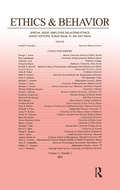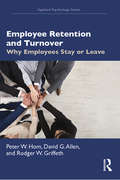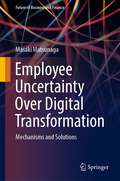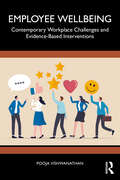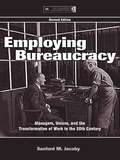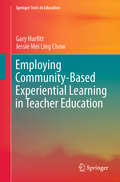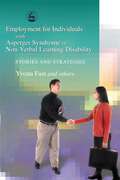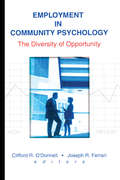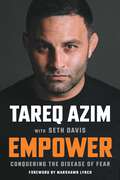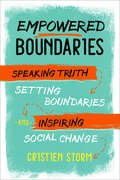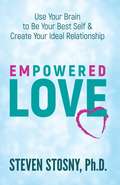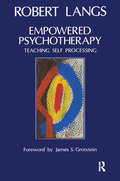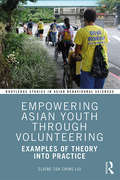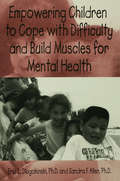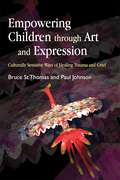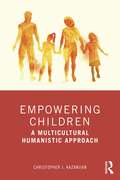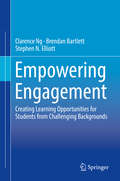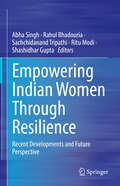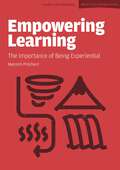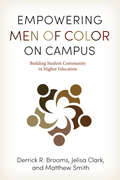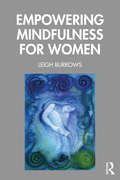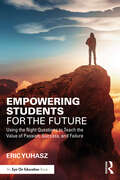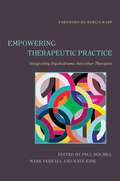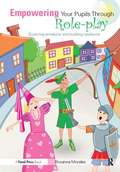- Table View
- List View
Employee Relations Ethics: A Special Issue of ethics & Behavior
by Gerald P. KoocherThis special issue reports on the changing social contract between employers and employees in botht he public and private work sectors with a focus on the American experience. The concept of "Employee Relations Ethics"(ERE) is introduced and defined as: "Treating employees properly and with respect and dignity." The lead article introduces a "new" theory of management which is employee centered rather than customer driven or stockholder mandate. The papers that follow address how: *the "changing nature of the American work force" has negatively effected US ERE; *universities skirt the law and contribute to ERE problems; *new work trend of working in teams impacts ERE; and *global compassion versus world competition determine and control ERE results. The final piece presents an ERE case study explaining the "broken covenant" between U.S. military policymakers and American troops during this era of warfare retrenchment and downsizing.
Employee Retention and Turnover: Why Employees Stay or Leave (Applied Psychology Series)
by Peter W. Hom David G. Allen Rodger W. GriffethThis exploration of what employee turnover is, why it happens, and what it means for companies and employees draws together contemporary and classic theories and research to present a well-rounded perspective on employee retention and turnover. The book uses models such as job embeddedness theory, proximal withdrawal states, and context-emergent turnover theory, as well as highlights cultural differences affecting global differences in turnover. Employee Retention and Turnover contextualises the issue of turnover, its causes and its consequences, before discussing underrepresented antecedents of turnover, key aspects of retention and methods for regulating turnover, and future research directions. Ideal for both academics and advanced students of industrial/organizational psychology, Employee Retention and Turnover is essential for understanding the past, present, and future of turnover and related research.
Employee Uncertainty Over Digital Transformation: Mechanisms and Solutions (Future of Business and Finance)
by Masaki MatsunagaThis book delves into the psychological and behavioral impact of the advent of digital transformation (DX) on white-collar employees in the modern organizational context. It uncovers how DX-driven uncertainty affects these workers' professional identity, self-efficacy, and job performance from a communication-centered perfective. While effective leadership can serve as a buffer, the intricate dynamics of these relationships await further exploration.To unravel these complex issues, the book employs an array of theoretical frameworks that have been tested against large, time-separated, dyadic datasets collected in Japan. In so doing, the studies introduced in this book illuminate how employees make sense of and communicate the uncertainties they face. Furthermore, it highlights a vision-driven leadership style and scrutinizes its unique attributes and limitations for addressing team members' uncertainty.This book is indispensable for executives and managers; it is a roadmap to steering digital transformation efforts without igniting resistance or conflict among frontline staff. For researchers, it's an invaluable resource for analyzing the mechanism of uncertainty management in today's fast-paced, tech-centric environments. Moreover, the book bridges the gap between interpersonal communication studies and other pivotal disciplines, such as leadership, management, organizational behavior, and social psychology in the context of stress and coping with uncertainty.
Employee Wellbeing: Contemporary Workplace Challenges and Evidence-Based Interventions
by Pooja VishwanathanDrawing on work and positive psychology, this insightful book addresses contemporary workplace challenges and analyses evidence-based interventions in the employee wellbeing domain. Recent years have seen significant developments in the area of employee wellbeing, with many organisations becoming more interested in wellbeing at work. This book begins by contextualising employee wellbeing before and after the onset of the pandemic and demonstrates how employers are seeking advice and proactively implementing wellbeing policies and practices. It goes on to consider such issues as employee voice, employee growth mindset, burnout, quiet quitting, sleep hygiene, and psychological safety. Each chapter is supported by thought-provoking questions and activities that encourage readers to reflect on their learning and apply their understanding of the material in practice, as well as suggestions for further reading that offer resources for continued study. The book closes by analysing a range of specific interventions that organisations can employ, including potential pitfalls to avoid. In so doing, it offers clear, practical guidance for employers looking to improve employee wellbeing in their organisation. Employee Wellbeing is an important read for stakeholders within and outside of organisations, and will also be of interest to students and academics studying work psychology, organisational behaviour, wellbeing at work and related fields.
Employing Bureaucracy: Managers, Unions, and the Transformation of Work in the 20th Century, Revised Edition (Organization and Management Series)
by Sanford M. JacobyDeftly blending social and business history with economic analysis, Employing Bureaucracy shows how the American workplace shifted from a market-oriented system to a bureaucratic one over the course of the 20th century. Jacoby explains how an unstable, haphazard employment relationship evolved into one that was more enduring, equitable, and career-oriented. This revised edition presents a new analysis of recent efforts to re-establish a market orientation in the workplace. This book is a definitive history of the human resource management profession in the United States, showing its diverse roots in engineering, welfare work, and vocational guidance. It explores the recurring tension between the new professional order and traditional line management. Using a variety of sources, Jacoby analyzes the complex relations between personnel managers, labor unions, and government from the late 19th century to the present.Employing Bureaucracy:*analyzes the origins of the modern employment relationship's distinctive features;*combines a variety of disciplinary perspectives, from business and labor history to economics, sociology, and management;*shows the transformation of the American workplace over the course of the 20th century, from market-oriented to bureaucratic to recent efforts to move back to a market orientation; and*provides the single-best and most sophisticated history of the origins and development of the modern "HR" profession.For historians, social scientists, and practitioners, this book is a readable and rewarding study. With the future of work currently under debate, it is critical that the historical process that produced the modern American workplace is understood.Read the Workforce Management Magazine review about Employing Bureaucracy at www.erlbaum.com.
Employing Community-Based Experiential Learning in Teacher Education (Springer Texts in Education)
by Gary Harfitt Jessie Mei ChowThis book positions itself at the intersection of the interrelationship between three key areas of initial teacher education: constructivist learning theories, teaching practicum, and the promotion of reflective practices. It presents an innovative approach to teacher preparation at undergraduate and postgraduate levels by critically examining the implementation of a mandatory experiential learning block across subject disciplines on undergraduate and postgraduate teacher preparation courses. This book presents multiple examples and case studies of these varied experiential learning projects that will inform academics, teachers and policymakers. Through these rich examples the authors set out to address the theory-practice dilemma in teacher education, where teachers-to-be are often positioned as ‘consumers’ of educational research in classrooms, read reference books and academic papers on teaching, and observe university and school experts before applying the same acquired theories and practices in their own classes. In the book the authors argue for a shift away from this conventional teacher-learning curriculum that is characterised by the separation of theory and practice, choosing instead to promote pedagogy and methods courses where practice underpins all learning. These pedagogical perspectives include the promotion of a diverse range of learning contexts (including on- and off-campus learning sites) for student teachers to experience during their time on teacher education courses.
Employment for Individuals with Asperger Syndrome or Non-Verbal Learning Disability: Stories and Strategies
by Yvona FastMost people with Non-Verbal Learning Disorder (NLD) or Asperger Syndrome (AS) are underemployed. This book sets out to change this. With practical and technical advice on everything from job hunting to interview techniques, from 'fitting in' in the workplace to whether or not to disclose a diagnosis, this book guides people with NLD or AS successfully through the employment mine field. There is also information for employers, agencies and careers counsellors on AS and NLD as 'invisible' disabilities, including an analysis of the typical strengths of somebody with NLD or AS, and how to use these positively in the workplace. Practical information and lists of career resources are supported by numerous case studies to inspire and advise. An essential resource for people with NLD or AS seeking or in employment and their existing or potential employers.
Employment in Community Psychology: The Diversity of Opportunity
by Joseph R Ferrari Clifford R O'DonnellDiscover the first book on employment opportunities in community psychology!Employment in Community Psychology: The Diversity of Opportunity is the first psychology career reference book for undergraduate psychology majors deciding on graduate schools, for graduate students in psychology seeking employment, and for psychology faculty advising their students. This book answers the questions “What can you do with a graduate degree in community psychology?” and “Who employs community psychologists?” Employment in Community Psychology addresses these questions through examples of graduates educated in community psychology and employed in diverse applied, research, and academic settings. In Employment in Community Psychology, you will explore the diversity of community psychology employment opportunities through the stories of current graduate students, community psychologists on their first job, and psychologists who have well-established positions in community research and action. Each experience is told in a story-telling style allowing the reader to grasp a deeper understanding of the employment opportunities that cannot be obtained through abstract description alone. Some of the experiences that highlight opportunities in the field include:working in the Institute for Families in Society at the University of South Carolina as a Research Associate working as a researcher at the Korea Institute of Social Psychiatry to determine how primary prevention and action research can be applied to the promotion of adolescent mental health in Korean society doctoral studies that developed into the first community psychology position focusing on the issues of social justice and reconciliation between Indigenous and non-Indigenous groups in Australian town non-traditional academic positions in psychology working as a social worker for Native non-profit health corporation in Alaska a policy-oriented community psychologist, or a c.p. in the disabilities field entering a second career in community psychology at mid-lifeEmployment in Community Psychology is an essential tool for undergrads and graduate students considering a career in community psychology. The rich palette of community psychology experiences that are laid out for the career researcher and advisor are sure to assist students in deciding what area of community psychology they would like to pursue.
Empower: Conquering the Disease of Fear
by Seth Davis Tareq AzimFrom finding common ground with warlords, introducing the Taliban to change, and working with NFL greats such as Marshawn Lynch, this uplifting and inspirational memoir from coach and personal development expert, Tareq Azim, will help you build a relationship with fear and embrace your own power.A descendant of Afghan nobles, Tareq Azim&’s family was forced to flee their homeland in 1979. He assimilated in the United States through his love of sports, excelling in wrestling, boxing, and football. In 2004, Azim decided to visit his home country, and upon arriving, he discovered countless children living on the streets, waiting for the inevitable recruitment into terrorist networks and anti-peace militias. Azim&’s close encounter with the ravages of a war-torn society taught him how pain can generate the most intense forms of fear, anxiety, and depression. He had found his salvation through sports and physical activity, and he knew these children could, too. He put his method to the test and created the Afghan Women&’s Boxing Federation, the official governing body for women&’s sports for the National Olympic Committee and the first ever in the history of any Islamic republic, proving that Afghanistan was ready for social change by addressing the harms of accumulated trauma. Now, his remarkable full story is revealed in this book that is both a memoir and a roadmap. Through his own experiences, he effortlessly explains how fear is an invitation to seek a deeper feeling within—a feeling that is achieved when we engage in righteous and sincere struggle. Only then will our choices be guided by values that help us avoid the pitfalls of moral and personal failure. Featuring actionable advice and varied clear-eyed case studies, including MMA star Jake Shields, former congresswoman Tulsi Gabbard, and San Francisco 49ers owner Jed York—Empower is the ultimate guide to living a life understanding that fear is there to help you.
Empowered Boundaries: Speaking Truth, Setting Boundaries, and Inspiring Social Change
by Cristien StormStrengthen relationships, build more resilient communities, and develop a stronger emotional toolbox Explaining power and privilege and the links between individual safety and community safety, Cristien Storm shows readers how to set emotional boundaries that build vibrant social movements and a better world for all. As there have been increases in violence against women, people of color, immigrants, and LGBTQI-identified people, there has been a corresponding demand for individual and community self-defense, boundary setting, and bystander trainings. Boundary setting can be used not just as a means for personal safety but as form of solidarity, resistance, and inspiration.From saying no to a boss who always asks you to work late, to setting a boundary with a loved one, to navigating an uncomfortable situation at the bus stop, Cristien Storm offers a new approach to verbal boundary setting that is accessible for all bodies and identities. Practical in scope, the book includes tools, tips, and strategies from Storm's decades of experience leading boundary-setting workshops. Grounded in resiliency and trauma-informed theory, Storm pays particular attention to the experiences of women, people of color, immigrants, and LQBTQI-identified people, making this necessary reading for anyone looking to create healthier relationships and build stronger communities.
Empowered Love: Use Your Brain to Be Your Best Self and Create Your Ideal Relationship
by Dr Steven StosnyEver wonder why your self-control, rationality, and compassion seem to go out the window when dealing with your partner? Couples therapist and relationship expert Steven Stosny explains it all in this revelatory book about the divide between our adult and our toddler brains. Too often, conflict in our intimate relationships reactivates our least-regulated "toddler" side, bringing out an instinctive desire to assert our own way and make everything a zero-sum game. Dr. Stosny shows the way toward overcoming these destructive impulses and nurturing our more loving and clear-eyed inclinations. Drawing upon his decades of experience in working with troubled marriages, he distills his insights into an actionable guide for embracing our best impulses in our relationships.Empowered Love is a valuable guide for married and live-in couples who struggle with an unhealthy dynamic; those already in individual or couples therapy who want a highly effective aid to help them communicate with their partner; and licensed therapists and counselors looking for an in-depth perspective on the developmental stages in play with relationship strife. "This book is for anyone who wants to learn from their painful relational past; rescue and revive a current relationship; and receive promise and hope for their future. This refreshingly brilliant book not only identifies the bottom line issues in relationships, it provides a concrete formula for creating mature, passionate relationships. In this book Dr. Stosny brilliantly identifies the underlying cause of all relationship dissatisfaction and distress. Refreshingly practical, the book draws a clear line between unhealthy and healthy interactions, enabling the reader to identify and prevent relationships disasters long before they happen. Steven Stosny's work never fails to inform, inspire and draw a clear roadmap to happier, healthier relationships." — Pat Love, Ed.D., LMFT, co-author You’re Tearing Us Apart: Twenty Ways We Wreck Our Relationships and Strategies to Repair Them"If you've ever wondered why all of your relationships are a breeze except for your intimate one, wonder no more. Steven Stosny explains how intimate partners often get stuck in repetitive and unproductive ways of interacting, and how, more importantly, to break free of these hurtful relationship habits. If your relationship isn't what it once was or what you hoped it would be, before you convince yourself that you picked the wrong partner, read this book! It combines cutting edge information about how our brains drive our choices in day to day interactions along with Stosny's extensive experience in helping people love each other more. This book is a must read!" —Michele Weiner-Davis, author of The Divorce Remedy"Combining the latest in neuroscience with decades of experience as a couples therapist specializing in the most difficult cases, Steven Stosny has written a clear, practical, immensely readable guide to arm and activate our better angels. Empowered Love is for anyone who wishes to show up more humanely in our closest and most important relationships."—Terry Real, author of The New Rules of Marriage
Empowered Psychotherapy: Teaching Self-Processing
by Robert LangsThis book presents some uncommon lines of clinical observation and thought that hopefully will shed new light on the work and thinking of the full range of helping professionals. It provides the insights and techniques that characterize the empowered form of psychotherapy.
Empowering Asian Youth through Volunteering: Examples of Theory into Practice (Routledge Studies in Asian Behavioural Sciences)
by Elaine Suk LiuThis book describes the origin, development and current state of volunteerism in Asia and Hong Kong. It also presents a field-tested model of empowering through volunteerism (namely, the CYEP at City University), that involves youth, governmental and non-governmental agencies and their clients in a rapidly changing society. Volunteerism is then described as a "win-win" situation for all stakeholders/actors. Volunteerism converges the needs, the struggles, the personal motives and the aspirations of the volunteers, together with the dreams and the difficulties of the clients, the expertise of the professionals and the (lack of) resources of the agencies, the new values emerging in society, the effects of globalization and the new policies. This book presents actual Asian case examples with the voices of the people involved on the CYEP (volunteers, officers, service recipients) who explain how volunteering changed their lives, their values, their attitudes toward social, civic and political participation, their ethics and sense of individual responsibility. These stories from the frontlines can be adopted and/or adopted for use by other institutions, but it is also the chance for understanding the emergence of volunteering in Asia overall, and its future direction.
Empowering Children To Cope With Difficulty And Build Muscles For Mental health
by Eric L. Dlugokinksi Sandra F. AllenThis book provides mental health professionals and counselors with a conceptual understanding and practical suggestions for educating children in skills that can promote their mental health. It focuses on preventive intervention with a science- and research-based conceptualization for children in the school. The authors also provide principles for effective delivery of suggested intervention techniques. Chapters in the first section focus on helping children deal with problem situations. The second section provides information to promote emotional health in children, including a knowledge of self, respect for self and others, healthy habit strength, and a balance between work and play. The final section includes suggestions for enhancing intervention efforts and principles proven effective in mental health education.
Empowering Children through Art and Expression: Culturally Sensitive Ways of Healing Trauma and Grief
by Paul Johnson Bruce St ThomasEmpowering Children through Art and Expression examines the successful use of arts and expressive therapies with children, and in particular those whose lives have been disrupted by forced relocation with their families to a different culture or community. The book explores how children express and resolve unspoken feelings about traumatic experiences in play and other creative activities, based on their observations of peer support groups, outreach programs and through individuals' own accounts. The authors argue that such activities in a safe context can be both a means of expressing trauma and a coping strategy for children to overcome it. This book combines personal and professional perspectives, using case examples as well as the authors' own childhood experiences, to demonstrate practical strategies for use with children, from drama and storytelling to sculpting with clay. It also equips the reader with knowledge of the theory behind these intervention techniques. This book will be a valuable resource for professionals working with traumatized children who have experienced loss, grief, relocation and other kinds of trauma.
Empowering Children: A Multicultural Humanistic Approach
by Christopher J. KazanjianThis unique text bridges multiculturalism and humanistic psychology, demonstrating how these areas can be effectively integrated to provide a foundation for engaging youth in the global community. Adapting the tenets of humanistic psychology for a modern, multicultural audience, Empowering Children: A Multicultural Humanistic Approach uses an after-school program called Kidz n’ Coaches to exemplify the ways in which community out-reach and humanistic psychology can be used together to meet the needs of diverse populations. Chapters also discuss issues of border cultures, with a focus on communities along the Mexican-American border, and offer practical tools for those looking to found their own community out-reach programs. Through a detailed case study and phenomenological study results, this book offers an immersive framework for multicultural humanistic psychology that will be of value to researchers and professionals alike.
Empowering Engagement: Creating Learning Opportunities for Students from Challenging Backgrounds
by Stephen N. Elliott Clarence Ng Brendan BartlettThis book examines promoting engagement for children and adolescents from challenging contexts or who are dealing with challenging conditions. The volume concentrates on three vulnerable groups: marginalized youths who have experienced repeated exclusion and sought their second chance in alternative education; children who are coming from economically, culturally, and linguistically disadvantaged backgrounds; and students with social or emotional issues. It defines engagement as evolving over the course of learning, an interpersonal as well as personal process involving students, learning environment, teachers, and peers. Chapters identify the complex personal, sociocultural, economic, and systemic barriers that keep these vulnerable students from fully engaging in school, and explore the enabling role of collaborative and supported learning activities in building academic success and a foundation for productive adult lives. In addition, chapters present instructional practices based on engagement enablers. Chapters also pinpoint specific learning skills and subject areas that can provide openings for promoting motivation and participation. Featured topics include: The importance of cognitive and social enablers for promoting learning engagement.Engagement in instruction from teachers and testing within classrooms.Student voice and perspective as a reading engagement enabler.Promoting academic engagement and aspiration for challenging and advanced mathematics.Alternative educational programs for re-engaging marginalized youths who “don’t fit”.Empowering Engagement is a must-have resource for researchers, scientist-practitioners, clinicians, and graduate students in the fields of child and school psychology, educational policy and politics, social work, motivation and learning, schooling and pedagogies, and related disciplines.
Empowering Indian Women Through Resilience: Recent Developments and Future Perspective
by Rahul Bhadouria Sachchidanand Tripathi Abha Singh Ritu Modi Shashidhar GuptaThe book examines various aspects of women empowerment in South Asia, particularly in India. The term “empowerment” refers to women’s liberation from social-economic restraints of reliance. Women worldwide actively work as leaders and establish new dimensions in all fields. Yet, in India, although women comprise around 50% of India’s population, most stay economically dependent, and in most Indian villages and towns, women are still denied fundamental education. After more than 75 years of independence as a country, we need to take a long-overdue in-depth look at empowering women in India and how women empowerment should be a powerful tool for national development. This book aims to discuss the empowerment of women through examining the social and personal challenges faced by women, as well as evaluating areas such as gender discrimination, education opportunity, and employment opportunity.
Empowering Learning: The Importance Of Being Experiential (World Class Schools)
by Dr Malcolm Pritchard Malcolm PritchardExperience - it is our first teacher in life, our early warning system, and our guide to world discovery. Experience connects the inner self to the outer world. It shapes our thoughts, informs our attitudes, motivates our actions. It is the most common mode of learning for all of humanity. Yet, hidden in plain sight, experiential learning is largely taken for granted by educators and researchers. We assume that experience is largely educational. We simply 'learn by doing' - don't we? There is a world of difference between 'doing' and 'doing intelligently'. By understanding how experience acts as a mechanism to inspire and scaffold memorable learning, we stand to gain greater control over this most powerful and universal force in human development. Learning, empowered by experience, is life-changing for learners; experience, purposefully harnessed, is transformational for schools.
Empowering Learning: The Importance Of Being Experiential (World Class Schools)
by Dr Malcolm Pritchard Malcolm PritchardExperience - it is our first teacher in life, our early warning system, and our guide to world discovery. Experience connects the inner self to the outer world. It shapes our thoughts, informs our attitudes, motivates our actions. It is the most common mode of learning for all of humanity. Yet, hidden in plain sight, experiential learning is largely taken for granted by educators and researchers. We assume that experience is largely educational. We simply 'learn by doing' - don't we? There is a world of difference between 'doing' and 'doing intelligently'. By understanding how experience acts as a mechanism to inspire and scaffold memorable learning, we stand to gain greater control over this most powerful and universal force in human development. Learning, empowered by experience, is life-changing for learners; experience, purposefully harnessed, is transformational for schools.
Empowering Men of Color on Campus: Building Student Community in Higher Education (The American Campus)
by Matthew Smith Derrick R. Brooms Jelisa ClarkWhile recruitment efforts toward men of color have increased at many colleges and universities, their retention and graduation rates still lag behind those of their white peers. Men of color, particularly black and Latino men, face a number of unique challenges in their educational careers that often impact their presence on campus and inhibit their collegiate success. Empowering Men of Color on Campus examines how men of color negotiate college through their engagement in Brothers for United Success (B4US), an institutionally-based male-centered program at a Hispanic Serving Institution. Derrick R. Brooms, Jelisa Clark, and Matthew Smith introduce the concept of educational agency, which is harbored in cultural wealth and demonstrates how ongoing B4US engagement empowers the men’s efforts and abilities to persist in college. They found that the cultural wealth(s) of the community enhanced the students’ educational agency, which bolstered their academic aspirations, academic and social engagement, and personal development. The authors demonstrate how educational agency and cultural wealth can be developed and refined given salient and meaningful immersions, experiences, engagements, and communal connections.
Empowering Mindfulness for Women
by Leigh BurrowsEmpowering Mindfulness for Women is centred around a a 5-day intensive mindfulness course attended by eight women from different backgrounds. The reader is invited to imagine they are actively participating in the teaching and learning moments and turning points encountered in teaching and learning mindfulness around themes such as making space for mindfulness, safeguarding mindfulness for women, engendering mindfulness, mindfulness dreaming and a mandala of wisdoms. Evocative accounts of experience bring to life the women’s growing awareness that mindfulness can be both a separate practice and a natural part of life and that it can help them to nurture what they have neglected in themselves by not tapping into the full spectrum of their experience. Each chapter provides useful follow-up activities and questions for individual or group reflection, journaling, sharing and conversation. Empowering Mindfulness for Women is aimed at those who teach mindfulness to women in educational, community or clinical settings and at women who want to learn mindfulness in a manner that positions them as experts in their own learning.
Empowering Students for the Future: Using the Right Questions to Teach the Value of Passion, Success, and Failure
by Eric YuhaszEmpowering Students for the Future: Using the Right Questions to Teach the Value of Passion, Success, and Failure arms educators with the tools to teach what we all wish we had learned in school. You will uncover how to help your students think deeper, redefine failure, and authentically create their definition of success. Author Eric Yuhasz offers a variety of practical ideas throughout, including rapid-fire questions and a bowl meeting structure to help students find their passions; activities to help students address negativity from social media plus negative, self-inflicted mantras they may unconsciously be following; a chart that enables students to see their progress toward achieving their definition of success; tips for discussing value, sacrifice, self-discipline, motivation, and the tyranny of low expectations; plus ideas for helping students embrace failure as a steppingstone toward learning and triumph. With clear strategies in each chapter, this unique book will show you how your learners can truly map out a happier, healthier, more successful future.
Empowering Therapeutic Practice: Integrating Psychodrama into other Therapies
by Anna Chesner Clark Baim Kate Kirk Eberhard Scheiffele Carl Dutton Chip Chimera Teresa Brown John Christey-Casson Paul Holmes Marcia Karp Mary Levens Mark Farrall Bernie Hammond Kate Bradshaw Tauvon Anna NapierThis book explores the exciting areas of overlap between psychodrama and other therapeutic schools and presents opportunities for their creative interaction and integration. Psychodramatists, to varying degrees, integrate the ideas and philosophies of other forms of psychotherapy into their clinical practice. Similarly, other therapists make use of the action methods of psychodrama. This edited volume contains contributions from a variety of dual-trained therapists qualified in psychodrama and trained in another therapeutic modality, including dramatherapy, occupational therapy, art therapy, family therapy, cognitive behavioural therapy (CBT), and more. Each chapter considers a different model of interaction and integration between therapeutic schools and explains how they can enhance and enrich a therapist's professional practice. In doing so, this book reveals an understanding of the core commonalities of the therapeutic process. With clinical case studies illustrating enhanced practice through creative interaction of the therapeutic schools, this book will be of interest to psychodramatists and all other therapists who integrate action techniques into their clinical practice.
Empowering Your Pupils Through Role-Play: Exploring Emotions and Building Resilience
by Rosanna MoralesIt can be hard to get children to talk about their feelings… Empowering Your Pupils through Role-play reveals the power of role-play in creating a safe space for students to explore emotions and build resilience through performance, discussion and the sharing of ideas, whilst enabling teachers to meet curriculum outcomes. Designed to enhance personal development, the practical activities help students become effective communicators and active investigators. Working independently of the teacher, students collaborate with their classmates to build trust, and can be actively involved in group activities, or take part as observers and commentators. Children know and understand about values by experiencing them, and throughout this book, there are opportunities for teachers to involve their pupils in: Performing Writing Directing Drawing Designing Building The activities in Empowering you Pupils through Role-play are challenging and designed to move students towards becoming alert and responsible young adults, actively able to engage with others and equipped with the skills to develop relationships and trust. The extensive role-play toolbox contains warm-up games, tips on writing and activities for mime, movement and improvisation. Teachers of children aged 4-11 with an interest in Personal, Social and Health Education will find this a practical and inspirational text. Rosanna Morales is an experienced author and teacher.
